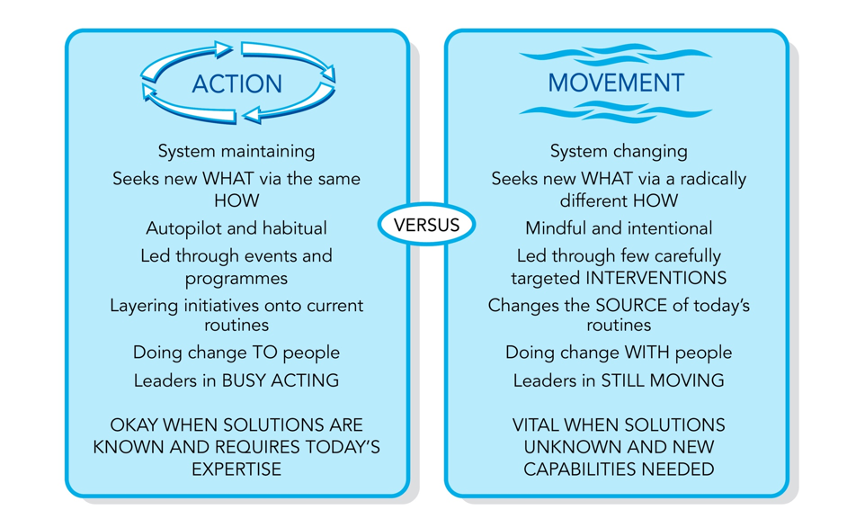
The crisis of the Covid-19 virus spread, unprecedented in modern times, is having a devastating impact on lives and livelihoods. At the time of writing, a quarter of the world’s population is in “lockdown” – an emergency protocol of forced self-isolation and social distancing to avoid the rate of transmission. This while our medical and scientific community scrambles to provide life-saving treatment that can get our communities and economies back on track. In this extraordinary, collectively restricted, and highly anxious context, many questions are being asked of our society: how come we are in this situation; what is Covid-19 shining a light on in our underlying mindsets and behaviour; is how we run our political institutions, economies and communities today really something to be proud of; will we come out of this a changed world, and a world for the better?
In this series of articles, our aim is to ask questions about how we and our leaders are handling change within this disruptive challenge, and to offer some frameworks of thinking and practice that might enable us to handle this crisis effectively – as, who knows, in this unprecedented situation, what “right” looks like? This, the first article in the series, examines the fundamental starting point for any change – understanding the critical difference between action, and movement.
We define change as “the disturbance of repeating patterns” – no wonder it is very hard to do. Not many of us enjoy disturbance. When things are stuck on repeat, we need to find new ways to get them off. And patterns are incredibly stable structures that keep systems secure, and whole. So, either embarking on change ourselves, or responding to an external threat that requires us to profoundly change our routines, is not easy. And therefore, leading change across a large system is not for the faint-hearted.
So, what’s the difference between “action” and “movement”? In action, we stay busily in our old routines while imagining we are going to new places. Such (usually) unconscious repetition of past routines shows up frequently in change. A common one these days is the company seeking new forms of agility yet bringing in agile methodologies via heavily-risk-managed centrally-led change programmes. Organisations tend to embark on change only if they can travel in ways that reinforce old routines.
Movement, on the other hand, is when we stop, pause, and notice the fundamental assumptions that are creating our routines. We open ourselves up to self-scrutiny, examine the source of our patterns, or what might be causing difficulty, and very bravely reconfigure that source. When leaders can engender that process in themselves and others, they can lead a movement of long-lasting irreversible change. Would a traditionally hierarchical organisation be prepared to get out of its routine and bring in agile practices via an empowered local group of community volunteers?
Our contention is that the reason why the oft-quoted 75% of change efforts fail, is because they are stuck in the rut of action, and not shifted to movement.
And now, as we collectively experience the externally-imposed crisis of the Covid-19 virus epidemic, we are dramatically required to change our routines. We sense a world yearning to use this event, as devastating as it is in the short term to lives and livelihoods, as a longer-term chance to reconfigure our society, irreversibly, for the better. The virus has shone a light on us and our shadow – good and bad. What assumptions around social and health inequality have we not questioned? What projections and stories have we conjured up about experts, truth, and what we wish for in our leaders, that now sound falsely misguided and hollow? Will the nature of capitalism, the role of the state, how we view the climate debate, and even how and where we choose to do our work, be re-imagined?
This is a chance to reboot the world. Yet let’s be careful. It’s easy to hijack the crisis with our own ego-fuelled narratives about what is being proven ‘right’ about our world views (“at last, we will all now stop flying and save our planet!”, “I was right all along that we needed far more state-controlled nationalisation of our infrastructure!”).
Wanting to better the world can be a very arrogant and stuck place in which to stand. We can find ourselves in this trap. Our deepest longing at Still Moving is for just one tiny shift – that we become more fully awake, and conscious of our routines and perspectives, so that we can more intentionally choose how to lead and live our lives.
Here’s a framework we use with our clients when helping them lead irreversible sustainable change. We will take you through the prompts that enable them, indeed ourselves, to aim for still movement, and not just more busy action. Set aside some quiet time for this contemplation. Focus for a moment on the current challenges the virus confronts you with. Still yourself. Tune in to what is arising in your thoughts, feelings, impulses. What narratives are you running in your mind that explain why things are as they are, and why they need to be different?
Figure 1. Action versus movement
 © Still Moving
© Still Moving
From system maintaining to system changing
When solutions are unknown and new capabilities are needed, using old routines to get to new places won’t get you very far. The system might scramble around and get very busy – a classic defensive routine in anxiety – “doing change”, yet bizarrely be operating from the same underlying mindsets and perspectives – system maintaining. Great change leaders don’t work in the system (keeping it where it is) but on the system (stepping back to see where and how it needs to change to become more flourishing). In this current Covid-19 crisis, we see political leaders stepping beyond partisan boundaries to seek collective solutions – dare we hope for an irreversibly changed political system in the future? Look now, from a point of distance and non-attachment, at your own system – where and how might it most be longing to be reconfigured?
Seek a new what via a radically different how
How much time have you and your colleagues spent on how you will be working in the future – indeed how you will lead towards this future, as your choice of change approach is fateful. If how you are approaching any changes feels familiar and comfortable, ask yourself, what might you need to shift in how you view the world and how you believe your system currently best produces its outcomes? Witness now how business consortia and public services are collaborating across disciplines and borders to answer the urgent call for ventilators . What radical new ways of operating are you taking on board, and “how might this new how” get you to new desired places?
Mindful and intentional
If you’re not fully conscious you can fall into leading the same way, choosing the default approach to change that’s been tried many times before, hoping for a transformed outcome yet staying stuck on autopilot. While the current world might feel like a contraction – stay at home, self-isolate, keep your distance – what about the consequent space it offers you in your day to become more aware, more noticing of the thoughts, feelings and impulses you hold that just pass you by on a normal busy day? Just as our political leaders are needing to resist the temptation to leap into same old action, and consider thoughtfully what to do next, are you pausing to reflect on the nature of the situation, tuning in, and considering more intentional response? How much time do you give yourself to stop, breathe, and reflect? Is this the moment to empty yourself and learn about not knowing?
Lead through a few targeted interventions
Getting busy leading change through events, new initiatives and programmes can be very wasteful. Could it be done differently? What are your choices? We use the metaphor of ‘corporate acupuncture’, deploying just a few small yet highly leveraged, carefully targeted interventions to work deeply at the source of a system and change its vitality. We now see our leaders needing to make big decisions about the few places to focus, a key one being activating networks of laboratories to collaborate to quickly produce virus tests and vaccines. Where are your hot spots to focus on that could create new patterns of thinking and acting, and give the biggest return on effort? What programmes and initiatives in your organisation now seem rather indulgent and wasteful?
Change the source of today’s routines
As you use the current space to pause, and you reflect on the source of existing patterns, ask yourself, what are the beliefs and assumptions that underlie how things are done around here? Do these still answer what’s needed by your people, by your customers, by investors? Do they need updating? Can you create the space for all this to be up for discussion? Has an unconscious measure of performance (a key source of behaviour!) been how many meetings you can schedule in a day – is that staying the same in your now physically distanced world, or might this be a chance to change the system? And how could you do this in a way that already brings the future into the present moment?
Doing change with people
A big feature of today’s response to the Covid-19 crisis has been our leaders’ realisation that this is a collective, collaborative task. Edicts from on high about social distancing rules, for example, have not always been heeded, and it has taken the inventive efforts of many local communities, food and care providers, to put need into action. What assumptions do you hold about your people? Do you believe they need a clear plan to follow in change or can you trust in the wisdom in the system? People support what they create, and systems change when its inherent intelligence becomes a resource. Listen to your intuition. Who could you be listening to more closely? Who has been asking to have a say?
Leaders in still moving – our final, critical prompt. In the next three articles, we will unpack the pivotal ingredient for achieving movement, as our research over the last two decades consistently shows that high quality leadership is the biggest success factor in delivering change outcomes. This small tiny virus has laid us low. Who’d have thought? Maybe this is a chance to move from grandiosity to humility, from proclaiming to inquiring, from knowing, to not knowing. Building the muscle for such deep underlying change starts in stillness – hence, still moving leadership. But such leadership will not happen unless we can see ourselves and our routines more clearly. Then, and only then, will we change our source.
♣♣♣
Notes:
- This blog post expresses the views of its author(s), not the position of LSE Business Review or the London School of Economics.
- Featured image: Courtesy of © Sytske Casimir sytske@still-moving.com, NOT under Creative Commons. All rights reserved.
- When you leave a comment, you’re agreeing to our Comment Policy
 Deborah Rowland has led change in major global corporations including BBC Worldwide, Gucci Group, PepsiCo and Shell, where she had vice-president of organisational development and group HR director roles. She is the author of Still Moving: How to Lead Mindful Change (Wiley 2017) and co-author of Sustaining Change: Leadership That Works (Wiley 2008). Deborah founded the change consultancy Still Moving, where she advises institutional leaders around the world on how to implement change in more effortless ways. She also speaks, writes, and teaches on the subject. In the 2017 Thinkers50 Radar she was named one of the new generation of management thinkers changing the world of business. She tends to her own inner game via regular yoga, meditation and art gazing, painting, and walks in nature, in particular along the spectacular coastal paths of Southern Cornwall.
Deborah Rowland has led change in major global corporations including BBC Worldwide, Gucci Group, PepsiCo and Shell, where she had vice-president of organisational development and group HR director roles. She is the author of Still Moving: How to Lead Mindful Change (Wiley 2017) and co-author of Sustaining Change: Leadership That Works (Wiley 2008). Deborah founded the change consultancy Still Moving, where she advises institutional leaders around the world on how to implement change in more effortless ways. She also speaks, writes, and teaches on the subject. In the 2017 Thinkers50 Radar she was named one of the new generation of management thinkers changing the world of business. She tends to her own inner game via regular yoga, meditation and art gazing, painting, and walks in nature, in particular along the spectacular coastal paths of Southern Cornwall.
 Paul Pivcevic came to consulting following careers in marketing and the media, fascinated by organisational systems, how they function and how they connect to their potential. He has had the privilege to work as a change agent in a range of contexts over 20 years: joining up services in the public sector working at chief executive level, supporting change leadership in energy, logistics, retail, banking, and industrial technology. He is a member of the founding group of the Still Moving consultancy, a tribe of change practitioners passionate about bringing mindful leadership into the world. More recently he has taken an interest in a regenerative practice developed in the United States: building the capability for systems to express and develop from their essence. In his spare time Paul leads a UK-wide network dedicated to supporting the planting of community food forests, climate resilient and abundant gardens that mimic forest systems.
Paul Pivcevic came to consulting following careers in marketing and the media, fascinated by organisational systems, how they function and how they connect to their potential. He has had the privilege to work as a change agent in a range of contexts over 20 years: joining up services in the public sector working at chief executive level, supporting change leadership in energy, logistics, retail, banking, and industrial technology. He is a member of the founding group of the Still Moving consultancy, a tribe of change practitioners passionate about bringing mindful leadership into the world. More recently he has taken an interest in a regenerative practice developed in the United States: building the capability for systems to express and develop from their essence. In his spare time Paul leads a UK-wide network dedicated to supporting the planting of community food forests, climate resilient and abundant gardens that mimic forest systems.
 Phil Hadridge supports leaders and groups working to achieve their ambitions, from his home and office in Cambridge. He works across a range of businesses with his broad perspective on change that clients find helpful when stuck in their own sector’s mindsets. Phil designs and hosts large meetings, both virtual and face to face, for energy and results. He develops boards and other leadership teams for their unique role in leading change and is a member of the Still Moving consultancy core team.
Phil Hadridge supports leaders and groups working to achieve their ambitions, from his home and office in Cambridge. He works across a range of businesses with his broad perspective on change that clients find helpful when stuck in their own sector’s mindsets. Phil designs and hosts large meetings, both virtual and face to face, for energy and results. He develops boards and other leadership teams for their unique role in leading change and is a member of the Still Moving consultancy core team.






Very nice and relevant article. Thanks for sharing